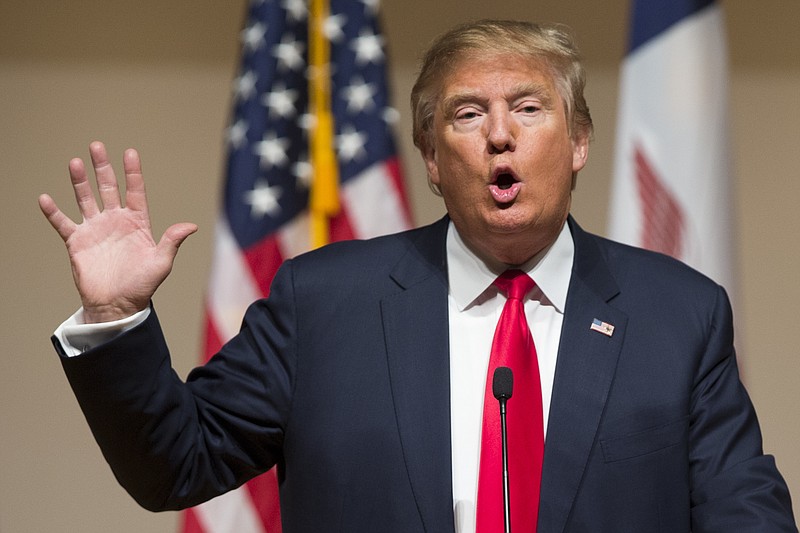WASHINGTON - Intelligence officers like to distinguish between knowable secrets that spies can steal and fuzzier mysteries that have to be assessed without final, definitive proof. The intent of Russia's covert meddling in the 2016 U.S. presidential election is probably somewhere between the two.
But after conversations with a half-dozen knowledgeable sources, here are two simple judgments: Russia's secret hacking against Democratic Party officials threatened the integrity of the U.S. political system. And President-elect Donald Trump shouldn't have criticized the CIA after its analysts told Congress about the Kremlin's efforts. Trump, unbelievably, seemed to be taking a potential adversary's side against his own nation's intelligence professionals.
The Russian hacking scandal went into overdrive last weekend after CIA analysts warned Congress that the goal of Russian hackers hadn't simply been to destabilize our political system, as previously thought, but to boost Trump and undermine his opponent, Hillary Clinton. That stronger judgment, first reported by The Washington Post, is said to have been based on an evolving analysis, rather than a "smoking gun."
President Obama had been notified earlier, in his daily intelligence brief and other documents, of this tougher evaluation. Early last week, he ordered Director of National Intelligence James Clapper, a 50-year veteran of the spy business, to conduct an assessment of the evidence that could be completed by Jan. 20 and presented to Trump, as a set of "lessons learned" about foreign political meddling.
The evidence that led CIA analysts to conclude that Moscow's aim in 2016 was to help Trump - rather than simply spread confusion - was based on a variety of sources. One indication was that the Russians didn't disseminate information from their snooping into Republican files, as they had with the product of hacking against Democrats; the Russians also didn't disseminate material after Trump's victory. The CIA had other, more sensitive evidence that officials won't discuss.
An administration official wouldn't comment on whether Obama had shared with Trump the intelligence assessment and plan for wider review. But it's unlikely such an important decision wouldn't have been conveyed to his transition team, which makes Trump's Twitter blasts at the CIA last weekend all the more puzzling and disturbing.
Obama's somewhat cautious response to Russia's covert intervention angers some Democrats. Rep. Adam Schiff, the ranking Democrat on the House Intelligence Committee, said in an interview Tuesday that he had been urging the White House since August to identify Russian hackers, talk with allies about imposing sanctions and take clandestine steps to deter Russia from further meddling.
"Had the administration begun months ago, we would now be much further along," Schiff said. "Failure to push back against Russia was seen by them as an open door. There need to be costs or they will do it again."
Schiff said he had no doubt the Russians wanted to hurt Clinton and help Trump. In Russian eyes, he said, Clinton had sought to undermine President Vladimir Putin after the 2011 parliamentary elections and to foment "color revolutions" in areas of Russian influence. Trump, by contrast, had lauded Putin, suggested lifting sanctions, and belittled NATO.
Schiff said Obama had initially resisted calls to "name and shame" Russia for its hacking because the president feared it would "sow doubt about the elections" and "play into Russia's hands by acknowledging what they were doing." Obama eventually agreed to an Oct. 7 public statement that "Russia's senior-most officials" had authorized actions "intended to interfere with the U.S. election process."
According to Schiff, the administration didn't take further public steps after Oct. 7 because Obama feared it could "risk escalation, including dumping of forged documents," in ways that would have further destabilized the election.
There's no question the White House worried, right up to Election Day, that Russian hackers might ignite what was already a toxic, combustible political environment. Trump's bogus claims that the election was rigged and that he might not accept the outcome added to Obama's concerns.
Obama has another five weeks left to shape the transition and deter Russian actions. The administration doesn't rule out the possibility of taking covert action in retaliation, which officials privately said hadn't been done before the election. The rubric now is simply that the administration will respond at a time and place of its choosing.
Perhaps the trickiest task will fall to Rep. Mike Pompeo, Trump's nominee to head the CIA. He must reassure a battered agency workforce that the next administration values its own intelligence officers and is vigilant against machinations by foreign spies.
Washington Post Writers Group
